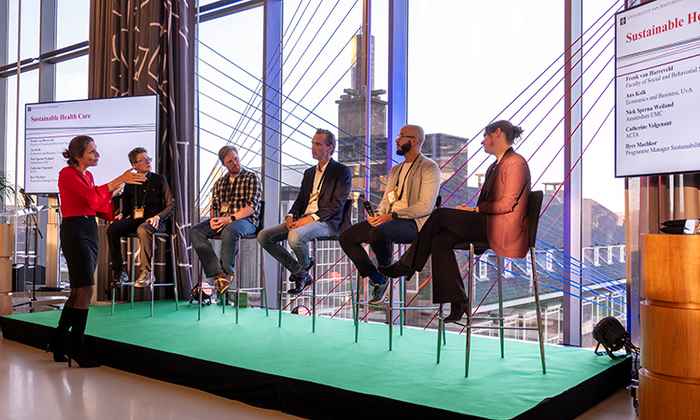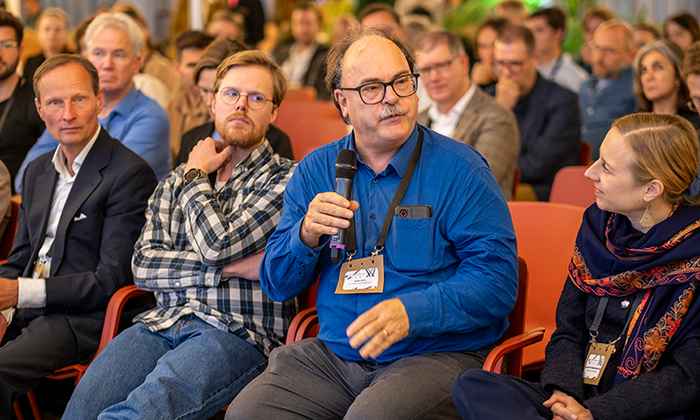UvA launches new climate institute SEVEN
13 November 2024

Why was SEVEN founded?
Although climate change research has been conducted at the UvA for decades, there was a widely shared feeling among the UvA board, researchers and students that we should and could do more. The Board wants to add strength and is giving an impetus of €1M a year to this end. With this money, we can unify and intensify climate change research in the faculties. In the first part of 2024, work was done to establish a UvA-wide, interdisciplinary, initiative to give shape and direction to this intensification. This culminated in the creation of SEVEN.
What is SEVEN and what will it do?
SEVEN is an institute in which we bring together the knowledge of all 7 UvA faculties. We use this UvA-wide knowledge for research to combat climate change and make vulnerable societies, anywhere in the world, more resilient. We focus on so-called systemic problems: causes of climate change that cannot be solved with isolated interventions (e.g. a new technology, a new law, a new form of reporting), but require coherent adjustments in systems. Examples we will work on include making healthcare more sustainable, the development and application of green hydrogen and the transition to more plant-based food. Precisely such system changes require bringing together knowledge from all different disciplines.
Consider, for example, the protein transition. Our current way of producing and consuming food, with about 60% consisting of animal proteins, is a major source of greenhouse gases. If we want to turn that around towards a much higher share of plant proteins, coherent interventions are needed in terms of new crops, new products that are attractive to consumers, behavioural change, communication about the risks of current food practices for climate, but also health, regulations, prices, business transitions and much more. SEVEN brings together all the necessary scientific knowledge for such concrete problems.
In doing so, we work closely with social partners such as the agricultural sector, supermarkets, consumer organisations and organisations in the food chain. Our starting point is that we can only do the questioning (what exactly is the social problem), the combination of scientific and practical knowledge, and the research and testing of possible interventions well in continuous cooperation with such parties. Of course, our autonomy and responsibility for conducting sound research will always be a prerequisite for cooperation. We will continue to determine independently - on scientific grounds - which question we can and should investigate, and in what way we do so. Seeking synergy with society will only strengthen this and enrich our scientific results.

Why was the name SEVEN chosen?
The name SEVEN stems from several motivations. The most immediate reason is the connection between the various disciplines, united at the UvA in seven faculties. But the number seven also has a more substantive meaning. It stands for the idea of 'seven-generation stewardship'. This is a concept that urges our current generation to consider the interests up to and including the seventh generation after us in everything we do. This idea originated with the Iroquois, six linguistically and ethnically related native peoples in North America. The idea is that we should think seven generations ahead and consider whether the decisions we make today will benefit future generations. This is a thought that also inspires our work.
Who is behind the name SEVEN?
As SEVEN aims to unite the disciplines of all seven UvA faculties, it was important to form a team in which staff from all faculties work together to give direction to SEVEN and ensure its success. I am doing this together with Peter van Dam (FGW), John Grin (FMG), Frenk van Harreveld (FMG), Ans Kolk (FEB), Niek Sperna Weiland (Amsterdam UMC), Catherine Volgenant (ACTA), Margaretha Wewerinke-Singh (FdR) and Bob van der Zwaan (FNWI). Here John Grin has a special role (hence the presence of two FMG members). SEVEN's approach requires in-depth knowledge and experience of research into system transitions, and John is an internationally recognised expert who helps to give that angle a proper place in all projects.
Behind this team of 9 colleagues is a large and diverse community of UvA researchers with a wealth of relevant knowledge. In recent years, we had already established a platform for UvA researchers in the field of sustainability: the UvA Sustainability Platform (USP). That currently has some 150 researchers, many of whom are doing research relevant to the topic of climate change. We want to shape and carry out SEVEN's projects with the expertise and energy of these researchers - this is precisely where our interdisciplinary strength will lie.
Is SEVEN there only for research or also for education?
We will start by setting up research projects, but we will closely link SEVEN's interdisciplinary way of working with education, both in undergraduate, masters and executive programmes ('lifelong development'). Through project teaching, we also want to involve students in concrete research projects. It is precisely important that we prepare new generations for what is needed to tackle complex issues such as the global climate crisis, and familiarise them with the interdisciplinary thinking and working required to do so.
When will SEVEN be a success?
In practical terms, SEVEN will be a success if we succeed in driving new research projects in collaboration with external parties and with the resources made available by the BoE, thereby increasing our research capacity. The BoE funds should start to work as a flywheel, enabling us to collectively realise more research resources, as a means to achieve more research results. But it is not just about money. In the end, SEVEN will mainly be a success if we actually manage to work together interdisciplinarily, to connect fundamental research with application-oriented research and achieve concrete results for a better healthcare system, a fair energy transition, the transition to plant-based nutrition and for all other possible climate transitions that urgently need a systemic solution.
Want to know more? See SEVEN - University of Amsterdam.